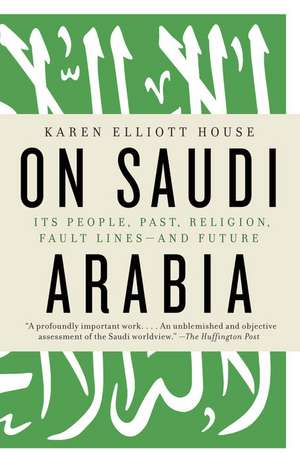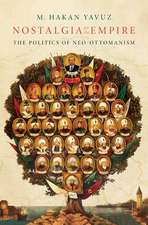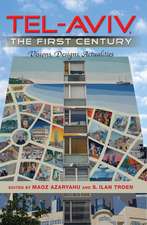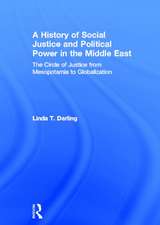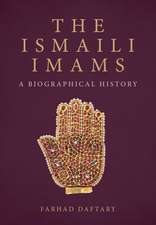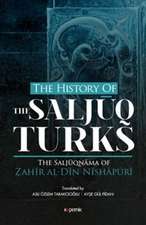On Saudi Arabia: Its People, Past, Religion, Fault Lines--And Future
Autor Karen Elliott Houseen Limba Engleză Paperback – 3 iun 2013
Saudi Arabia finds itself threatened by fissures and forces on all sides, and On Saudi Arabia explores in depth what this portends for the country’s future—and our own.
Preț: 111.51 lei
Nou
Puncte Express: 167
Preț estimativ în valută:
21.34€ • 23.17$ • 17.93£
21.34€ • 23.17$ • 17.93£
Carte disponibilă
Livrare economică 01-15 aprilie
Preluare comenzi: 021 569.72.76
Specificații
ISBN-13: 9780307473288
ISBN-10: 0307473287
Pagini: 320
Ilustrații: 30 ILLUSTRATIONS
Dimensiuni: 142 x 193 x 16 mm
Greutate: 0.23 kg
Editura: Vintage Publishing
ISBN-10: 0307473287
Pagini: 320
Ilustrații: 30 ILLUSTRATIONS
Dimensiuni: 142 x 193 x 16 mm
Greutate: 0.23 kg
Editura: Vintage Publishing
Notă biografică
Karen Elliott House is a graduate of the University of Texas at Austin. She studied and taught at Harvard University’s Institute of Politics and was a senior fellow at the John F. Kennedy School of Government at Harvard University. House lives in Princeton, New Jersey, with her husband, Peter R. Kann, and their children.
Extras
CHAPTER 1
Fragile
Observing Saudi Arabia is like watching a gymnast dismount the balance beam in slow motion. As the body twists frame by frame through the air, we instinctively hold our breath to see if the hurtling gymnast will nail the landing or crash to the mat. So it is with the Al Saud monarchy of Saudi Arabia.
As revolutionary fervor sweeps the Middle East, the world watches with trepidation the aged princes at the head of the House of Saud struggle to maintain a precarious balance. Because Saudi Arabia produces fully one of every four barrels of oil sold on the world market, what happens in this most veiled of Arab societies will affect not only the future of 19 million Saudis but also the stability and prosperity of the global economy, and it will touch the lives of every citizen in the world. The stakes for all Americans are far higher here than anywhere else in the volatile Middle East. After all, the United States, which imports two-thirds of its oil, has gone to war twice in a period of thirteen years in no small part to ensure access to Persian Gulf oil.
For nearly eighty years, a succession of Al Saud princes have traversed the balance beam, skillfully maintaining control of a deeply divided, distrustful, and increasingly dispirited populace, by cunningly exploiting those divisions, dispensing dollops of oil money, and above all, bending religion to serve Al Saud political needs. This ruling family never promised democracy—and still doesn’t. Nor does it bother with sham elections to present the appearance of legitimacy, as do so many other Arab regimes. The Al Saud believe they have an asset more powerful than the ballot box: they have Allah.
Nearly three hundred years ago, when Arabia was nothing but harsh desert inhabited by wild and warring tribes, Muhammad al Saud, leader of one such tribe, discovered a magic lamp in the person of Muhammad ibn Abd al Wahhab, a fundamentalist Islamic scholar bent on imposing on Arabia his version of the pure Islam of the Prophet Muhammad a millennium earlier. So fanatical was this preacher that by the time the two men met, Abd al Wahhab was fleeing for his life, having destroyed the tomb of one of the Prophet’s companions and stoned to death a woman accused of adultery in a public display of his Islamic fervor. None of this bothered Muhammad al Saud. He saw in the preacher’s call for Islamic jihad the opportunity to use religion to trump his tribal enemies and conquer Arabia. Sure enough, the Al Saud sword, wielded in the name of religion rather than mere tribal conquest, proved triumphant. The first Saudi state was declared in 1745. Arabia has been under the sway of the Al Saud—and their religious partners—off and on ever since, with the most recent Saudi state established in 1932 by the current king’s father, Abdul Aziz bin Al Saud.
Over all those years, religion has been a pillar of strength, steadying the Al Saud atop the kingdom that bears their name. To this day, the monarchy justifies its rule by claiming to personify, protect, and propagate the one true religion. The Saudi monarch styles himself as “Custodian of the Two Holy Mosques,” a unique title intended to convey his spiritual leadership of all Islam. King, after all, is a temporal and rather common title.
These days, however, the old magic of divide and conquer, the majesty of appropriated religion, and even the soothing balm of money, lots of money, are not enough to blind a new generation of Saudis to the decay rotting the very foundations of their society and threatening their future and that of their children. Islam as preached is not practiced. Jobs are promised but not delivered. Corruption is rampant, entrapping almost every Saudi in a web of favors and bribes large and small, leaving even the recipients feeling soiled and resentful. Powerful and powerless alike are seeking to grab whatever they can get, turning a society governed by supposedly strict Sharia law into an increasingly lawless one, where law is whatever the king or one of his judges says it is—or people feel they can get away with.
All of this is widely known to Saudis. For the first time, the Internet allows the young generation—70 percent of Saudis are under thirty years of age, with more than 60 percent age twenty or younger—to know what is taking place at home and abroad. These young people are aware of government inefficiency and princely corruption, and of the fact that 40 percent of Saudis live in poverty and at least 60 percent cannot afford a home. They know that nearly 40 percent of Saudi youth between twenty and twenty-four are unemployed, at the very age when most men would like to marry if only they could afford the bride price. They know that 90 percent of all employees in the private sector of their economy are imported foreign workers, whom business owners, often including Al Saud princes, exploit for low wages. Saudis, undereducated and often indolent, sit idly by rather than work for what they regard as slave wages doing menial jobs. If all too many Saudi men who could work do not, even educated Saudi women who want to work often cannot. The female half of the Saudi population remains sheltered, subjugated, and frustrated.
Saudis hear their minister of labor say the kingdom must create two hundred thousand well-paying jobs every year until 2030 to sop up the currently unemployed Saudi men (leave aside women) and provide work for wave after wave of young men who will enter the labor market over the next two decades. Yet it is no secret to Saudis that in each of the past five years, the government has created only about fifty thousand new jobs, and that the 2.5 million jobs created by private industry over that period have gone overwhelmingly to foreigners.
All this they know, and now share with each other through social media. These young Internet-savvy Saudis are breaching the walls that have been so carefully constructed and maintained over decades by the regime to keep Saudis separated and distrustful of those outside their family or tribe, to ensure their near total dependence on Al Saud protection and largesse. Stability (more recently coupled with the promise of prosperity) in exchange for loyalty was for most of the last three hundred years the social contract binding the people to their Al Saud rulers. But no longer. These days young Saudis compare their lives with those of contemporaries in neighboring Gulf states and elsewhere, and that comparison leaves many of them humiliated and embittered. All too many of these young Saudis know they are living third-world lives in a country that has more than $400 billion in foreign reserves and, in recent years, annual oil revenue in excess of $200 billion. Yet the government fails to provide basic services like quality education, health care, or even proper sewage and drainage to protect from floods.
And things just keep happening to stoke anger and forge bonds among the young. In January 2011, as Cairo was erupting in revolution, the kingdom’s second largest city, Jeddah, flooded for the second time in little more than a year in a deluge of rainwater and sewage. For decades corrupt businessmen and bureaucrats had stolen billions of dollars allocated for construction of a proper sewage and drainage system, leaving the city vulnerable to floods of sewage-polluted rainwater. The first flood, in 2009, killed more than 120 people, displaced another 22,000, and destroyed 8,000 homes. King Abdullah promised “never again,” yet in less than fourteens months, once again Jeddah was drowning. Young Saudis using Facebook and Twitter helped stranded citizens find safety and shelter when authorities were scarcely seen. “Hang your head, you are a Saudi,” one angry youth posted on the Internet, a cynical reversal of a favorite royal admonition to the young to “Hold your head high. You are a Saudi.” Another depicted the Saudi national emblem—two swords crossed over a palm tree—as two mops crossed atop a stack of buckets. Even the generally respected monarch, King Abdullah, was the target of unprecedented criticism for such a visible failure to deliver on his previous promise. His photo was posted on the Internet with a giant red X and the words, “Why do you give them all this power when they all are thieves?”
The Internet, and the power of knowledge that it provides to Saudis, may be the biggest threat to the Al Saud, but it is not the only one. If Saudi citizens increasingly are in touch, their rulers are increasingly out of touch. King Abdullah, eighty-nine, generally popular for his effort to make at least modest reforms, is seen as isolated by his retainers and, at any rate, was slowed by age and serious back surgery in 2010 and again in 2011. Despite his age and infirmities, the king has largely governed without a crown prince since taking the monarchy’s mantle in 2005 because Sultan, eighty-four, was suffering from cancer and Alzheimer’s and finally died in October 2011. The new crown prince, Nayef, is seventy-seven and said to be ailing from diabetes and poor circulation that leave him unable to walk unaided much of the time.
After them? No one knows. What scares many royals and most ordinary Saudis is that the succession, which historically has passed from brother to brother, soon will have to jump to a new generation of princes. That could mean that only one branch of this family of some seven thousand princes will have power, a prescription for potential conflict as thirty-four of the thirty-five surviving lines of the founder’s family could find themselves disenfranchised. Saudis know from history that the second Saudi state was destroyed by fighting among princes. Older Saudis vividly recall how this third and latest Saudi state was shaken by a prolonged power struggle between the founder’s two eldest sons after his death in 1953.
Today’s Saudi Arabia is reminiscent of the dying decade of the Soviet Union, when one aged and infirm Politburo chief briefly succeeded another—from Brezhnev to Andropov to Chernenko—before Gorbachev took power with reform policies that proved too little too late. “They keep dying on me,” Ronald Reagan famously said of the four Soviet leaders he dealt with in less than three years. The next U.S. president almost surely will have the same experience with ailing Saudi rulers.
Beyond all this, religion, once a pillar of stability, has become a source of division among Saudis. Many Saudis, both modernists and religious conservatives, are offended by the Al Saud’s exploitation of religion to support purely political prerogatives. The accommodating flexibility of religious scholars is eroding the legitimacy of both the Al Saud and their religious partners in power. Saudis hear religious scholars condemning infidels in the sacred land of the Prophet, yet they recall that the religious hierarchy obediently approved the presence of U.S. troops when the king needed them to confront Saddam Hussein in 1990. The scholars similarly condemn any mixing of men and women and deploy their religious police to enforce this ban on ordinary Saudis, but they acquiesced in 2009, when the king opened a richly endowed university where Saudi men and women mix with each other and with foreign infidels. And of course, they have long accepted all sorts of heresies, including movie theaters and women driving at the large compound of Saudi ARAMCO, the national oil company, which almost alone produces the funds that fill the kingdom’s treasury. Sin in the company that funds the kingdom—including privileges for the religious establishment—apparently is permissible.
The modernizers see this and whisper to each other that if the Al Saud can manipulate the religious when it suits their interests, why not press religious authorities to permit more change more rapidly? For their part, religious fundamentalists feel betrayed by both the religious establishment and the Al Saud putting their mutual interest in power and money ahead of the word of Allah. “We are hypocrites tricking each other, lying to each other as the government has taught us,” laments one devout imam. “We are not Islamic.”
For all their frustrations, most Saudis do not crave democracy. To conservative Saudis, especially the many devoutly religious, the idea of men making laws rather than following those laid down by Allah in the Koran is antithetical and unthinkable. More modern and moderate Saudis, aware the Al Saud have banned any political and most all social organizations even down to something as apolitical as photography clubs, fear that without Al Saud rule, the country would face tribal, regional, and class conflict—or rule by religious zealots. With seventy thousand mosques spread across the kingdom, only the religious are an organized force; moderates fear that power inevitably would be seized by the most radical. Whatever lies in Saudi Arabia’s future, it is not democracy.
What unites conservatives and modernizers, and young and old, is a hunger not for freedom but for justice; for genuine rule of law, not rule by royal whim. They want a government that is transparent and accountable, one that provides standard services such as are available in far less wealthy societies: good education, jobs, affordable housing, and decent health care. Saudis of all sorts resent having to beg princes for favors to secure services that should be a public right. They also want to be allowed to speak honestly about the political and economic issues that affect their lives. Yet when a conservative professor of religion at Imam University, the cornerstone of religious education in the kingdom, dared to suggest on the Internet that Saudis be permitted to take public their pervasive private discussions on royal succession, he was jailed.
The country fundamentally is a family corporation. Call it Islam Inc. The board of directors, some twenty senior religious scholars who theoretically set rules for corporate behavior, are handpicked by the Al Saud owners, can be fired at royal whim, and have nothing to say about who runs the company. Al Saud family members hold all the key jobs, not just at the top but right down through middle management, even to regional managers. (The governors of all thirteen Saudi provinces are princes.) At the bottom of the company, ordinary employees are poorly paid and even more poorly trained because management doesn’t want initiative that might threaten its control. Imagine working for a company where you can’t aspire even to a regional management position, let alone influence those who control the company that determines your livelihood and your children’s future. Not surprisingly, the Saudi employees of such a stultifying company are sullen, resentful, and unmotivated. Most feel no pride in their country but focus on getting even with their overlords by chiseling on their expense accounts and showing up late for work—in effect, by grabbing what they can get from their corporate masters. And given the widespread Saudi cynicism over the unholy alliance of profligate princes and pliable religious leaders, it is not surprising that many Saudis see the kingdom not as Islam Inc. but rather as Un-Islam Inc.
All this raises the question: Can the Al Saud regime reform in time to save itself? Are the royal princes capable of curbing corruption, improving government efficiency, and permitting people honestly to express themselves on taboo topics like religion, the role of women, and the royal family? Can they abandon a history of divide and conquer—of exploiting deep religious, tribal, regional, and gender divisions—and recog- nize that those divisions now threaten rather than enhance Al Saud survival? If so, can they begin to help Saudis bridge divides and reach a consensus that allows the kingdom to move forward, rather than flounder in perpetual checkmate? Or will the House of Saud prove to be a house of cards?
“If we do not share responsibility and create action, we will face stagnation or catastrophe,” says Prince Saud bin Abdul Mohsin, a grandson of the founder and one of thirteen royal provincial governors. “This family has delivered for people in the past. But if we can’t do it now, they will not see the need for the family.”
Fragile
Observing Saudi Arabia is like watching a gymnast dismount the balance beam in slow motion. As the body twists frame by frame through the air, we instinctively hold our breath to see if the hurtling gymnast will nail the landing or crash to the mat. So it is with the Al Saud monarchy of Saudi Arabia.
As revolutionary fervor sweeps the Middle East, the world watches with trepidation the aged princes at the head of the House of Saud struggle to maintain a precarious balance. Because Saudi Arabia produces fully one of every four barrels of oil sold on the world market, what happens in this most veiled of Arab societies will affect not only the future of 19 million Saudis but also the stability and prosperity of the global economy, and it will touch the lives of every citizen in the world. The stakes for all Americans are far higher here than anywhere else in the volatile Middle East. After all, the United States, which imports two-thirds of its oil, has gone to war twice in a period of thirteen years in no small part to ensure access to Persian Gulf oil.
For nearly eighty years, a succession of Al Saud princes have traversed the balance beam, skillfully maintaining control of a deeply divided, distrustful, and increasingly dispirited populace, by cunningly exploiting those divisions, dispensing dollops of oil money, and above all, bending religion to serve Al Saud political needs. This ruling family never promised democracy—and still doesn’t. Nor does it bother with sham elections to present the appearance of legitimacy, as do so many other Arab regimes. The Al Saud believe they have an asset more powerful than the ballot box: they have Allah.
Nearly three hundred years ago, when Arabia was nothing but harsh desert inhabited by wild and warring tribes, Muhammad al Saud, leader of one such tribe, discovered a magic lamp in the person of Muhammad ibn Abd al Wahhab, a fundamentalist Islamic scholar bent on imposing on Arabia his version of the pure Islam of the Prophet Muhammad a millennium earlier. So fanatical was this preacher that by the time the two men met, Abd al Wahhab was fleeing for his life, having destroyed the tomb of one of the Prophet’s companions and stoned to death a woman accused of adultery in a public display of his Islamic fervor. None of this bothered Muhammad al Saud. He saw in the preacher’s call for Islamic jihad the opportunity to use religion to trump his tribal enemies and conquer Arabia. Sure enough, the Al Saud sword, wielded in the name of religion rather than mere tribal conquest, proved triumphant. The first Saudi state was declared in 1745. Arabia has been under the sway of the Al Saud—and their religious partners—off and on ever since, with the most recent Saudi state established in 1932 by the current king’s father, Abdul Aziz bin Al Saud.
Over all those years, religion has been a pillar of strength, steadying the Al Saud atop the kingdom that bears their name. To this day, the monarchy justifies its rule by claiming to personify, protect, and propagate the one true religion. The Saudi monarch styles himself as “Custodian of the Two Holy Mosques,” a unique title intended to convey his spiritual leadership of all Islam. King, after all, is a temporal and rather common title.
These days, however, the old magic of divide and conquer, the majesty of appropriated religion, and even the soothing balm of money, lots of money, are not enough to blind a new generation of Saudis to the decay rotting the very foundations of their society and threatening their future and that of their children. Islam as preached is not practiced. Jobs are promised but not delivered. Corruption is rampant, entrapping almost every Saudi in a web of favors and bribes large and small, leaving even the recipients feeling soiled and resentful. Powerful and powerless alike are seeking to grab whatever they can get, turning a society governed by supposedly strict Sharia law into an increasingly lawless one, where law is whatever the king or one of his judges says it is—or people feel they can get away with.
All of this is widely known to Saudis. For the first time, the Internet allows the young generation—70 percent of Saudis are under thirty years of age, with more than 60 percent age twenty or younger—to know what is taking place at home and abroad. These young people are aware of government inefficiency and princely corruption, and of the fact that 40 percent of Saudis live in poverty and at least 60 percent cannot afford a home. They know that nearly 40 percent of Saudi youth between twenty and twenty-four are unemployed, at the very age when most men would like to marry if only they could afford the bride price. They know that 90 percent of all employees in the private sector of their economy are imported foreign workers, whom business owners, often including Al Saud princes, exploit for low wages. Saudis, undereducated and often indolent, sit idly by rather than work for what they regard as slave wages doing menial jobs. If all too many Saudi men who could work do not, even educated Saudi women who want to work often cannot. The female half of the Saudi population remains sheltered, subjugated, and frustrated.
Saudis hear their minister of labor say the kingdom must create two hundred thousand well-paying jobs every year until 2030 to sop up the currently unemployed Saudi men (leave aside women) and provide work for wave after wave of young men who will enter the labor market over the next two decades. Yet it is no secret to Saudis that in each of the past five years, the government has created only about fifty thousand new jobs, and that the 2.5 million jobs created by private industry over that period have gone overwhelmingly to foreigners.
All this they know, and now share with each other through social media. These young Internet-savvy Saudis are breaching the walls that have been so carefully constructed and maintained over decades by the regime to keep Saudis separated and distrustful of those outside their family or tribe, to ensure their near total dependence on Al Saud protection and largesse. Stability (more recently coupled with the promise of prosperity) in exchange for loyalty was for most of the last three hundred years the social contract binding the people to their Al Saud rulers. But no longer. These days young Saudis compare their lives with those of contemporaries in neighboring Gulf states and elsewhere, and that comparison leaves many of them humiliated and embittered. All too many of these young Saudis know they are living third-world lives in a country that has more than $400 billion in foreign reserves and, in recent years, annual oil revenue in excess of $200 billion. Yet the government fails to provide basic services like quality education, health care, or even proper sewage and drainage to protect from floods.
And things just keep happening to stoke anger and forge bonds among the young. In January 2011, as Cairo was erupting in revolution, the kingdom’s second largest city, Jeddah, flooded for the second time in little more than a year in a deluge of rainwater and sewage. For decades corrupt businessmen and bureaucrats had stolen billions of dollars allocated for construction of a proper sewage and drainage system, leaving the city vulnerable to floods of sewage-polluted rainwater. The first flood, in 2009, killed more than 120 people, displaced another 22,000, and destroyed 8,000 homes. King Abdullah promised “never again,” yet in less than fourteens months, once again Jeddah was drowning. Young Saudis using Facebook and Twitter helped stranded citizens find safety and shelter when authorities were scarcely seen. “Hang your head, you are a Saudi,” one angry youth posted on the Internet, a cynical reversal of a favorite royal admonition to the young to “Hold your head high. You are a Saudi.” Another depicted the Saudi national emblem—two swords crossed over a palm tree—as two mops crossed atop a stack of buckets. Even the generally respected monarch, King Abdullah, was the target of unprecedented criticism for such a visible failure to deliver on his previous promise. His photo was posted on the Internet with a giant red X and the words, “Why do you give them all this power when they all are thieves?”
The Internet, and the power of knowledge that it provides to Saudis, may be the biggest threat to the Al Saud, but it is not the only one. If Saudi citizens increasingly are in touch, their rulers are increasingly out of touch. King Abdullah, eighty-nine, generally popular for his effort to make at least modest reforms, is seen as isolated by his retainers and, at any rate, was slowed by age and serious back surgery in 2010 and again in 2011. Despite his age and infirmities, the king has largely governed without a crown prince since taking the monarchy’s mantle in 2005 because Sultan, eighty-four, was suffering from cancer and Alzheimer’s and finally died in October 2011. The new crown prince, Nayef, is seventy-seven and said to be ailing from diabetes and poor circulation that leave him unable to walk unaided much of the time.
After them? No one knows. What scares many royals and most ordinary Saudis is that the succession, which historically has passed from brother to brother, soon will have to jump to a new generation of princes. That could mean that only one branch of this family of some seven thousand princes will have power, a prescription for potential conflict as thirty-four of the thirty-five surviving lines of the founder’s family could find themselves disenfranchised. Saudis know from history that the second Saudi state was destroyed by fighting among princes. Older Saudis vividly recall how this third and latest Saudi state was shaken by a prolonged power struggle between the founder’s two eldest sons after his death in 1953.
Today’s Saudi Arabia is reminiscent of the dying decade of the Soviet Union, when one aged and infirm Politburo chief briefly succeeded another—from Brezhnev to Andropov to Chernenko—before Gorbachev took power with reform policies that proved too little too late. “They keep dying on me,” Ronald Reagan famously said of the four Soviet leaders he dealt with in less than three years. The next U.S. president almost surely will have the same experience with ailing Saudi rulers.
Beyond all this, religion, once a pillar of stability, has become a source of division among Saudis. Many Saudis, both modernists and religious conservatives, are offended by the Al Saud’s exploitation of religion to support purely political prerogatives. The accommodating flexibility of religious scholars is eroding the legitimacy of both the Al Saud and their religious partners in power. Saudis hear religious scholars condemning infidels in the sacred land of the Prophet, yet they recall that the religious hierarchy obediently approved the presence of U.S. troops when the king needed them to confront Saddam Hussein in 1990. The scholars similarly condemn any mixing of men and women and deploy their religious police to enforce this ban on ordinary Saudis, but they acquiesced in 2009, when the king opened a richly endowed university where Saudi men and women mix with each other and with foreign infidels. And of course, they have long accepted all sorts of heresies, including movie theaters and women driving at the large compound of Saudi ARAMCO, the national oil company, which almost alone produces the funds that fill the kingdom’s treasury. Sin in the company that funds the kingdom—including privileges for the religious establishment—apparently is permissible.
The modernizers see this and whisper to each other that if the Al Saud can manipulate the religious when it suits their interests, why not press religious authorities to permit more change more rapidly? For their part, religious fundamentalists feel betrayed by both the religious establishment and the Al Saud putting their mutual interest in power and money ahead of the word of Allah. “We are hypocrites tricking each other, lying to each other as the government has taught us,” laments one devout imam. “We are not Islamic.”
For all their frustrations, most Saudis do not crave democracy. To conservative Saudis, especially the many devoutly religious, the idea of men making laws rather than following those laid down by Allah in the Koran is antithetical and unthinkable. More modern and moderate Saudis, aware the Al Saud have banned any political and most all social organizations even down to something as apolitical as photography clubs, fear that without Al Saud rule, the country would face tribal, regional, and class conflict—or rule by religious zealots. With seventy thousand mosques spread across the kingdom, only the religious are an organized force; moderates fear that power inevitably would be seized by the most radical. Whatever lies in Saudi Arabia’s future, it is not democracy.
What unites conservatives and modernizers, and young and old, is a hunger not for freedom but for justice; for genuine rule of law, not rule by royal whim. They want a government that is transparent and accountable, one that provides standard services such as are available in far less wealthy societies: good education, jobs, affordable housing, and decent health care. Saudis of all sorts resent having to beg princes for favors to secure services that should be a public right. They also want to be allowed to speak honestly about the political and economic issues that affect their lives. Yet when a conservative professor of religion at Imam University, the cornerstone of religious education in the kingdom, dared to suggest on the Internet that Saudis be permitted to take public their pervasive private discussions on royal succession, he was jailed.
The country fundamentally is a family corporation. Call it Islam Inc. The board of directors, some twenty senior religious scholars who theoretically set rules for corporate behavior, are handpicked by the Al Saud owners, can be fired at royal whim, and have nothing to say about who runs the company. Al Saud family members hold all the key jobs, not just at the top but right down through middle management, even to regional managers. (The governors of all thirteen Saudi provinces are princes.) At the bottom of the company, ordinary employees are poorly paid and even more poorly trained because management doesn’t want initiative that might threaten its control. Imagine working for a company where you can’t aspire even to a regional management position, let alone influence those who control the company that determines your livelihood and your children’s future. Not surprisingly, the Saudi employees of such a stultifying company are sullen, resentful, and unmotivated. Most feel no pride in their country but focus on getting even with their overlords by chiseling on their expense accounts and showing up late for work—in effect, by grabbing what they can get from their corporate masters. And given the widespread Saudi cynicism over the unholy alliance of profligate princes and pliable religious leaders, it is not surprising that many Saudis see the kingdom not as Islam Inc. but rather as Un-Islam Inc.
All this raises the question: Can the Al Saud regime reform in time to save itself? Are the royal princes capable of curbing corruption, improving government efficiency, and permitting people honestly to express themselves on taboo topics like religion, the role of women, and the royal family? Can they abandon a history of divide and conquer—of exploiting deep religious, tribal, regional, and gender divisions—and recog- nize that those divisions now threaten rather than enhance Al Saud survival? If so, can they begin to help Saudis bridge divides and reach a consensus that allows the kingdom to move forward, rather than flounder in perpetual checkmate? Or will the House of Saud prove to be a house of cards?
“If we do not share responsibility and create action, we will face stagnation or catastrophe,” says Prince Saud bin Abdul Mohsin, a grandson of the founder and one of thirteen royal provincial governors. “This family has delivered for people in the past. But if we can’t do it now, they will not see the need for the family.”
Recenzii
A New York Times, Washington Post, and Newsweek Best Book of the Year
“A profoundly important work. . . . An unblemished and objective assessment of the Saudi worldview.”
—The Huffington Post
“Few books about Saudi Arabia will chill the reader as artfully as Karen Elliott House’s. . . . Provocative . . . a must-read for anyone interested in human rights, global politics and the future of the weakening Saudi state.”
—San Francisco Chronicle
“Recommended reading for all those seeking a new perspective on one of the world’s most consequential societies.”
—Henry A. Kissinger
“[House] skillfully unveils this inscrutable place for regional specialists and general readers alike.”
—The New York Times Book Review
“Fascinating. . . . An important book that offers insights into the kingdom’s fault lines, as well as gentle suggestions for a positive diplomacy.”
—The Washington Post
“The vignettes [House] assembles are not only entertaining and lucidly drawn, but also offer a rare glimpse into a world that is normally closed to Western reporters. . . . Eloquent and timely. . . . Presenting these issues in a readable yet serious book is a rare feat indeed, and she should be commended for it.”
—The New Republic
“House demonstrates an unparalleled understanding of the dynamics of Saudi society. Her extraordinary access to Saudis from all walks of life and her keen insights . . . greatly enrich the reader’s understanding.”
—Senator Susan Collins (Maine), Ranking Member of the Senate Committee on Homeland Security and Governmental Affairs
“A gem of reporting on one of the hardest stories to crack. . . . [House] is one of the wiliest and most determined newspaperwomen of her generation. . . . Illuminating. . . . Masterful.”
—The New York Sun
“A valuable assessment of where the kingdom is and where it might go. A stimulating and worthwhile read.”
—George P. Shultz
“A book that future Saudi leaders should read carefully. It exposes incisively and dispassionately the social contradictions and the potential political vulnerabilities of contemporary Saudi Arabia. . . . Timely and truly important.”
—Zbigniew Brzezinski, former United States National Security Advisor
“Revealing and impressively reported . . . House's 30-plus years' experience in one of the least accessible countries makes us see, hear, and experience Saudi Arabia like a local.”
—Tina Brown, The Daily Beast, "Favorite Books of 2012"
“A deeply reported look at an increasingly complicated and fragile society.”
—The Kansas City Star
“The internal contradictions of a medieval theocracy in thrall to modern-day petrocapitalism give Pulitzer Prize-winning journalist House ample material . . . Illuminating . . . cogently written.”
—Publishers Weekly
“An incisive analysis of divisive dynamics inside the world’s most important supplier of oil. House asks hard questions about the future of Saudi Arabia.”
—Graham Allison, Director of the Belfer Center for Science and International Affairs, Harvard University
“Well-researched, informative. . . . House succeeds in capturing the diversity of Saudi society, painting a more complex picture than the caricature of oil wells and extreme wealth.”
—Kirkus
“A profoundly important work. . . . An unblemished and objective assessment of the Saudi worldview.”
—The Huffington Post
“Few books about Saudi Arabia will chill the reader as artfully as Karen Elliott House’s. . . . Provocative . . . a must-read for anyone interested in human rights, global politics and the future of the weakening Saudi state.”
—San Francisco Chronicle
“Recommended reading for all those seeking a new perspective on one of the world’s most consequential societies.”
—Henry A. Kissinger
“[House] skillfully unveils this inscrutable place for regional specialists and general readers alike.”
—The New York Times Book Review
“Fascinating. . . . An important book that offers insights into the kingdom’s fault lines, as well as gentle suggestions for a positive diplomacy.”
—The Washington Post
“The vignettes [House] assembles are not only entertaining and lucidly drawn, but also offer a rare glimpse into a world that is normally closed to Western reporters. . . . Eloquent and timely. . . . Presenting these issues in a readable yet serious book is a rare feat indeed, and she should be commended for it.”
—The New Republic
“House demonstrates an unparalleled understanding of the dynamics of Saudi society. Her extraordinary access to Saudis from all walks of life and her keen insights . . . greatly enrich the reader’s understanding.”
—Senator Susan Collins (Maine), Ranking Member of the Senate Committee on Homeland Security and Governmental Affairs
“A gem of reporting on one of the hardest stories to crack. . . . [House] is one of the wiliest and most determined newspaperwomen of her generation. . . . Illuminating. . . . Masterful.”
—The New York Sun
“A valuable assessment of where the kingdom is and where it might go. A stimulating and worthwhile read.”
—George P. Shultz
“A book that future Saudi leaders should read carefully. It exposes incisively and dispassionately the social contradictions and the potential political vulnerabilities of contemporary Saudi Arabia. . . . Timely and truly important.”
—Zbigniew Brzezinski, former United States National Security Advisor
“Revealing and impressively reported . . . House's 30-plus years' experience in one of the least accessible countries makes us see, hear, and experience Saudi Arabia like a local.”
—Tina Brown, The Daily Beast, "Favorite Books of 2012"
“A deeply reported look at an increasingly complicated and fragile society.”
—The Kansas City Star
“The internal contradictions of a medieval theocracy in thrall to modern-day petrocapitalism give Pulitzer Prize-winning journalist House ample material . . . Illuminating . . . cogently written.”
—Publishers Weekly
“An incisive analysis of divisive dynamics inside the world’s most important supplier of oil. House asks hard questions about the future of Saudi Arabia.”
—Graham Allison, Director of the Belfer Center for Science and International Affairs, Harvard University
“Well-researched, informative. . . . House succeeds in capturing the diversity of Saudi society, painting a more complex picture than the caricature of oil wells and extreme wealth.”
—Kirkus
